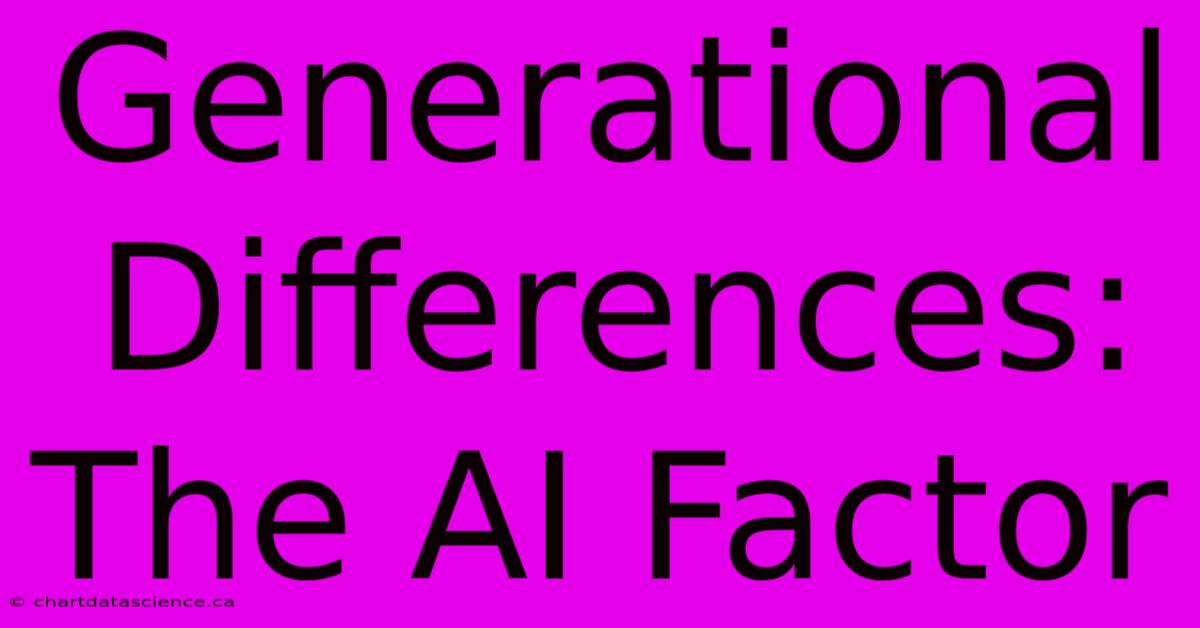Generational Differences: The AI Factor

Discover more detailed and exciting information on our website. Click the link below to start your adventure: Visit My Website. Don't miss out!
Table of Contents
Generational Differences: The AI Factor
The rapid advancement of artificial intelligence (AI) is creating a fascinating new dynamic in the workplace and beyond – one that's significantly impacted by generational differences. How different generations perceive, interact with, and adapt to AI is shaping the future of technology and its integration into our lives. This article delves into the generational nuances of AI adoption and its implications.
Understanding Generational Perspectives on AI
Each generation has a unique relationship with technology, influenced by the technological landscape they grew up in. This shapes their understanding and acceptance of AI.
The Silent Generation (born before 1946):
This generation often views AI with a degree of skepticism and perhaps even fear. Many haven't grown up with technology as a pervasive force, and the concept of intelligent machines can feel alien and potentially threatening. Education and reassurance are crucial for bridging this gap and highlighting AI's potential benefits, such as improved healthcare or assistance with daily tasks.
Baby Boomers (born 1946-1964):
Baby Boomers are likely to be more adaptable than the Silent Generation, having witnessed significant technological advancements throughout their lives. However, they may still require more guidance and training when interacting with AI-powered tools. Clear, simple instructions and user-friendly interfaces are essential for maximizing their engagement and acceptance.
Generation X (born 1965-1980):
Gen X is often considered the first generation to truly grow up with personal computers. They're generally more tech-savvy and comfortable with new technologies, making them quicker to adapt to AI. However, they may still express concerns about job displacement and the ethical implications of AI. Open communication and addressing these anxieties is vital.
Millennials (born 1981-1996):
Millennials have lived with the internet and mobile technology their entire lives. They're highly comfortable using technology and are generally more receptive to AI. They often see AI as a tool for increased efficiency and innovation. However, they might be critical of AI's potential biases and societal impact.
Generation Z (born 1997-2012):
Gen Z has grown up in a world saturated with technology, making them incredibly tech-literate. They often see AI as an integral part of their lives, seamlessly integrated into their everyday experiences. Their familiarity breeds acceptance, but they also have high expectations for ethical and responsible AI development.
The Workplace and the AI Divide
Generational differences in AI adoption have significant implications for the workplace. Companies need to implement strategies that cater to the unique needs and concerns of each generation.
Bridging the Gap: Training and Support
- Comprehensive training programs: These programs should be tailored to different learning styles and technological proficiency levels.
- Mentorship opportunities: Pairing experienced employees with those less comfortable with AI can facilitate knowledge transfer and build confidence.
- Accessible resources: Providing easy-to-use manuals, tutorials, and ongoing support is crucial for successful AI adoption.
Leveraging Generational Strengths
Each generation brings unique skills and perspectives to the table. Companies can leverage these strengths by:
- Utilizing the experience of older generations: Their institutional knowledge and problem-solving skills are invaluable when integrating AI into existing workflows.
- Harnessing the tech-savviness of younger generations: Their innate understanding of AI can drive innovation and development.
The Future of AI and Generational Harmony
The successful integration of AI into society requires acknowledging and addressing generational differences. By fostering open communication, providing adequate training, and leveraging the strengths of each generation, we can build a future where AI benefits everyone, regardless of age. The key is to understand that AI is not a replacement for human interaction and ingenuity, but rather a powerful tool that can augment human capabilities when used effectively and ethically. This understanding, coupled with inclusive strategies, will be crucial for navigating the evolving landscape of AI and its impact on society.

Thank you for visiting our website wich cover about Generational Differences: The AI Factor. We hope the information provided has been useful to you. Feel free to contact us if you have any questions or need further assistance. See you next time and dont miss to bookmark.
Also read the following articles
| Article Title | Date |
|---|---|
| Kraven Review Aarons Performance Disappoints | Dec 12, 2024 |
| Is Facebook Experiencing An Outage | Dec 12, 2024 |
| Are Facebook Instagram Whats App Down Canada | Dec 12, 2024 |
| Knicks Hawks Starting Five Lineup Predictions | Dec 12, 2024 |
| Nj Drone Swarm Fbi Seeking Solutions | Dec 12, 2024 |
